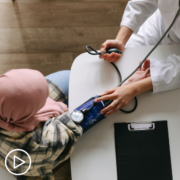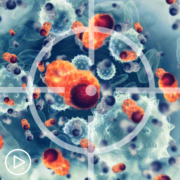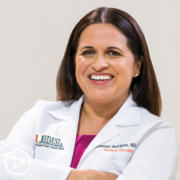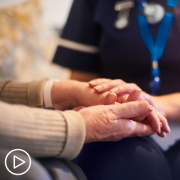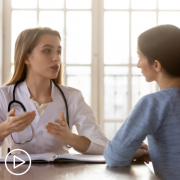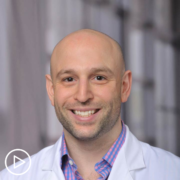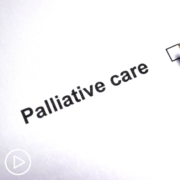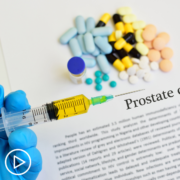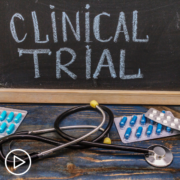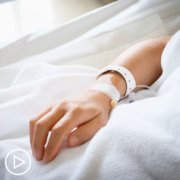How Can I Get the Best Myeloproliferative Neoplasm (MPN) Care? from Patient Empowerment Network on Vimeo.
There are many exciting developments in the myeloproliferative neoplasms (MPNs) research pipeline, but how can patients get the best possible MPN care? Internationally respected MPN expert Dr. Claire Harrison from Guy’s and St. Thomas’ Hospital in London shares information about research updates, treatment strategies, clinical trials, and how to achieve patient-centered care for you or your loved one.
See More from Best MPN Care No Matter Where You Live
Related Resources:
Transcript:
Dr. Nicole Rochester:
Hello and welcome. My name is Dr. Nicole Rochester, I’m a pediatrician and a professional health advocate, and your host for today’s Patient Empowerment Network program. We are thrilled that you have decided to tune in. With so many exciting developments in the research pipeline from myeloproliferative neoplasms or MPNs. We’re going to answer several important questions during today’s program, how can you as a patient access the best possible MPN care? Will there be alternative treatment strategies for MPN patients who have failed previous therapies? Should you consider a clinical trial as a path to enhancing your care? Whether you’re living with polycythemia vera, essential thrombocythemia or myelofibrosis, we have so much to unpack and we are joined by world-renowned and highly respected MPN expert, Dr. Claire Harrison. Thank you so much for joining us, Dr. Harrison, it’s an honor and a privilege to join with you.
Dr. Claire Harrison:
It’s a great pleasure and it’s a privilege to join you as well.
Dr. Nicole Rochester:
Following this program, you will receive a survey and we’d be delighted if you take some time to provide your feedback that helps inform future MPN programs that we produce. Please remember that this program is not a substitute for seeking medical care, so please be sure to connect with your healthcare team to determine what is best for you. Now, let’s dive right into this very important topic, how can you get the best myeloproliferative neoplasm care.
Dr. Harrison, we know that the treatment landscape for MPN is rapidly changing and keeping up with the pace of the developments can be challenging both for healthcare professionals and certainly for patients and their families, so I was wondering if you can give us a general overview of the treatment landscape and maybe highlight anything that’s new and in development that you think would be helpful for the audience.
Dr. Claire Harrison:
Well, sure, I think this is obviously really interesting, very important. It’s a fast-moving field. And one of the first changes actually completely hot off the press is a brand new diagnostic criteria that has been produced by two separate groups that are shortly about to be published, kind of just seeing pre-published and those of us that have been privileged to be involved, have seen them. So that’s gonna really focus the mind of clinicians on how do we achieve the diagnosis, and that’s the first thing that’s really important, get an accurate diagnosis, don’t just accept well, you’ve got an MPN, actually, it’s really important to know what type you’ve got.
Maybe as much do you tell as possible in terms of the genetic mutation or change that underlies the disease, because that is increasingly important in what we call prognostication, understanding what the risk of events happening due to the disease actually is. When we make a diagnosis, we sometimes can’t be accurate and we might have to go back and revisit them, so some patients don’t get a PV, ET or MF diagnosis, they might get an MPN unclassified. That’s okay, but it’s important to keep revisiting that.
Once we’ve made a diagnosis, then it’s really important to think about what the risk is to the patient, and we’ve had some changes to our risk classifications recently, right from the ET end of the spectrum where we’re thinking more and more actually, those patients who are under the age of 60 with a lower count and the CALR mutation, do we even need to give you aspirin because we might be increasing the risk of bleeding.
To the other end of the spectrum for patients with myelofibrosis, a more aggressive disease, we want to know more about your mutational profile, so we’re doing more powerful genomic tests and assessing them, your prognosis, and then what the features of your disease are that need treatment. And there are lots of changes, which I think we’ll get into later in our conversation here and lots of new options, which are really important, I just also don’t to leave this segment without saying to all of you who are listening, it’s important that you understand your disease, it’s important that you understand the diagnosis, prognosis, etcetera, and you get the best care.
But that’s maybe not enough, you need to know that you’re taking good care of you, and that’s something that’s really important to all of us, so you need to know that you’re managing your vascular risk don’t just think about your blood. Think about the fact that you know if you’re smoking, quit smoking, if you’re drinking too much, cut it down, if you’re not walking enough, walk more, lose weight. The majority of patients with MPN actually have a problem with a blood clot, not a further complication of their disease, so maybe we’ll stop there and then we can dive in a bit more deeply
Dr. Nicole Rochester:
Thank you, I appreciate you pointing out the changes with the diagnosis. I’m really excited to learn more about that, and also pointing out the importance of self-care and some of the other risk factors that individuals with MPN can mitigate. So I think that’s extremely important. Can you share a little about what’s in the robust pipeline of potential therapies for patients with MPN, what is it that you’re excited about? And is the future bright in this area?
Dr. Claire Harrison:
I think the future is really bright from the point of view of de-escalating treatment as well as newer treatment, so I think it’s important to point that because all treatments have potential complications inside of it, so as we understand that some of these conditions may have very low risk for patients, it’s important to understand that, and de-intensify, I call that calreticulin (post ET?), I would also call out ET, essential thrombocythemia, which lacks a known driver mutation, so-called triple-negative ET, emerging data suggests that may have very low risk for patients, but what you all want to hear about, of course, is what’s new treatment-wise. So I think just to call out, I’m really excited that there will be a new trial this year for ET patients with Bomedemstat, which is an LSD-1 inhibitor, new target, new molecule. We’ve been testing it in myelofibrosis and we’ve tested it now in a bunch of patients with ET, and it seems to be very efficiently reducing the platelet count not affecting hemoglobin and patients appear to get a good benefit with regard to fatigue, which we know is the number one symptom for patients with MPN, so I’m excited about that because it’s been a long time since we’ve had a new treatment for patients with ET. And then for patients with PV, increasingly across the globe, the availability of this newer formulation of interferon, Besremi is becoming more available and the latest data with that agent suggests that it may be superior to standard therapy such as hydroxyurea, hydroxycarbamide in terms of clotting, et cetera, is really important.
Interestingly, and we may both have to think back to our med school days on this, we’ve been targeting the iron pathway in for patients with PV. So I always tell my patients with PV, do not let anyone give you iron tablets without speaking to one of our team because that’s like putting oxygen on the fire, it’s like feeding the red cell production. So there is a new agent called Rusfertide PTG-300, which targets the iron pathway and allows iron to build up in the body, but it doesn’t allow it to get to the bone marrow and so, this is a new treatment for PV patients, which might reduce the need for iron removal by phlebotomy or venesection, and has been also shown to give symptomatic benefit, and then of course, there’s a bunch of new treatments for patients with myelofibrosis, that’s probably the busiest part of the portfolio at the moment.
We’ve just seen positive data with me Momelotinib, which is one of the fourth JAK inhibitors, very strong data from the momentum study, good results in patients even with low platelet counts down to 25, and then I’m really excited to see strong data coming with Navitoclax and Pelabresib, which are other agents targeted at are the pathways in myelofibrosis and then finally, in Denmark, they’ve been looking at vaccination strategies, and I know my patients are really interested in vaccination and (inaudible). I don’t have anything new to say (inaudible), but I do have something new to say on vaccination.
So in Denmark, they’ve been looking at producing a vaccination against the calreticulin mutation Nicole, because it’s expressed on the surface of the blood cells, so antibodies can find it. So this is ongoing, no positive result as yet, but it’s still ongoing and there are newer taking off with regards to vaccination structures, and I think that’s really exciting.
Dr. Nicole Rochester:
Wow, there is a lot on the horizon for MPN patients. That is extremely exciting, Dr. Harrison, how can patients best keep up with the new treatments and communicate with their doctors in a way that makes sure that they have access to these new therapies?
Dr. Claire Harrison:
Well, I think patient advocacy groups are really important here, and use of social media and the internet, you’re only a few clicks away from updated data, programs like these, but you also have to trust your team and trust your doctor. We all have to keep up to date. That is a professional requirement, and we also are all networked, so I’d probably get 10-15 emails a day from colleagues saying, Hi Claire, can I talk to you about this? There was an email just the other day about a patient in Washington, actually a very young child, we are all connected.
We all want the best for our patients. But do you remember that you can contribute as a patient to advance this in your field, and I know many patients are really interested in this, if you are asked to submitting a blood sample, giving permission for us to use your data. So if we can touch maybe on the field of real world data and real-world data collection here would be good, so what about the real world data? What does that mean? And so this is becoming a really important way that’s recognized by the FDA and other approval agencies in the world, so in Europe, we have EMEA for example, and in the UK, we have NHRA as a way of collecting data on agents, so once they are approved, we collect data with regard to how the patients do.
We’ve traditionally done this, but increasingly, as we use electronic data for our patients, we’re more able to collect real-world data, how does my patient who is with myelofibrosis on Ruxolitinib in my clinic inside East London do. So if we can pull that data, we learn a lot more about how these agents are working in patients outside of clinical trial, so you will be contributing if you allow us to collect that kind of data, we discovered JAK2 mutations, CALR mutations, etcetera from samples collected from patients and data. If you want to be part of a clinical trial, then by all means, ask your healthcare team, many MPN centers have lists of trials, and you can always look at clinicaltrials.gov, but boy you throw up a lot of different options when you search in that… On that website.
Dr. Nicole Rochester:
Thank you. I think it’s important to talk about real-world data because in this day and age, many of us are very protective about our personal health information and we should be, but as you stated, having access to that data is really a key way to advance the science and technology in the treatment of some of these conditions, so I really appreciate you sharing that.
Dr. Claire Harrison:
I think just to point out, and I’m sure the audience is acutely aware of what we learn about COVID? We learned an awful lot about COVID from real-world data from all you MPN patients who gave samples, who told us about how you did with COVID, that’s how we learned about what happened to patients during covid with MPN, how they responded to vaccination, etcetera. It’s really powerful. And your data will be anonymized, it won’t be linked back to you, Nicole Rochester, or me, Claire Harrison it will be completely anonymous.
Dr. Nicole Rochester:
Absolutely, thanks for clarifying that. I want to go back to treatment strategies, you’ve mentioned earlier about low-risk versus high-risk patients, and that some of those criteria are changing. How are treatment strategies changing for low-risk and high-risk patients with MPN?
Dr. Claire Harrison:
It’s complicated because we need to think across the entities, and we don’t have an answer to that for patients with MPN unclassified and we don’t actually have a good answer to that for this entity called pre-fibrotic myelofibrosis which does appear and is strongly recognized in the new diagnostic criteria, but for ET, for example, low-risk patients I mentioned triple negative, calreticulin, m-positive, young patients, platelets less than 1500, not too much changing their queries about aspirin or not, and then for PV patients, we haven’t really changed all kind of high-risk criteria and for both ET and PV, the questionnaire is, should we use the treatment above aspirin or above aspirin (inaudible). And for the most part, that would be hydroxycarbamide, hydroxyurea, which is the commonest treatment used worldwide or Interferon, and these are the right treatment for some patients and not the right treatment for other patients, so some patients can be very fixated on interferon is the absolute best, but there is no clear evidence of that, and there are some patients who interferon is not the right treatment, but low versus high risk becomes even more important for myelofibrosis patients.
And here, we’re thinking about using a risky strategy like transplantation for those patients who have higher risk disease, and we’re using, as I mentioned to you, these molecular markers and newer prognostic tools to stratify patients, and it is important to remember is a patient leave if someone puts your data into a prognostic tool and that comes up with five years, but it doesn’t mean to say five years on the dot your times up, that’s an average.
And if we put your data into a slightly different tool, we might get something else. So for the most part, we make decisions like transplants, we are learning more about transplantation and outcomes from that, and then in some countries, some treatments are used for patients who fall into intermediate or high-risk categories, and some clinical trials are based on that as well. I would want to say about myelofibrosis, and something I think I would really like to see changed, not changing yet, but changed, is that we should be able to intervene for patients with a low-risk disease. If my myelofibrosis patients have breast cancer, we would not be going there, then you’ve got low-risk disease we’ll put you on watch and wait, watch and wait is really hard for our patients, we know that I can see you nodding.
Dr. Claire Harrison:
You know that too, right? So if these were patients with breast cancer we would not say, We’ll just watch and wait. So I would really like to see in the next five to 10 years a treatment that we could use earlier in the disease course, but there is nothing at the moment, but we’re looking at that. The other thing we’re looking at, if we’ve got a minute or so is the different endpoint, so we’re trying to understand what does it mean if you’re a (?), so the amount of abnormal genes you’ve got goes down, the amount of bone marrow fibrosis you’ve got goes down. And again, this is something we’ll collect in a clinical trial, but also from real-world data.
Dr. Nicole Rochester:
Wonderful. Wow, thank you. What about for patients who have failed therapies, are there any treatment strategies for MPN patients who have failed traditional therapies?
Dr. Claire Harrison:
Yes, in fact, actually, that’s where we’re evaluating new therapies across all of these entities, so if you’re a PV or an ET patient and you failed a therapy, then this is where, for example, in ET, we would be looking at Bomedemstat or we’re looking at the bromodomain inhibitor Pelabresib, and there’ll be other agents that we’ll be looking at, or we might be looking at vaccination. And for MF patients that while there are a bunch of different therapies for patients who you have not tolerated or progressed through standard therapy. So actually, there’s a lot of options, some of them are already approved and some of them are in clinical trials.
Dr. Nicole Rochester:
And you mentioned clinical trials, and so I think this is a perfect opportunity to transition and start to talk more about clinical trials as a treatment option for NPM patients and really focusing on treatment access, what would you say are the unmet needs in access related to MPN and care, specifically as it relates to clinical trials, and what can we do to address those unmet needs?
Dr. Claire Harrison:
Well, I think there is a problem with rare diseases in terms of geographical access to trials, and we often find patients have to travel a long way. I know that’s true in North America as well as in Europe. And we’re very lucky in our geographical locations, but in some parts of the world, some companies or doing not open clinical trials, so I think there’s an access issue. I think also there is something about patients have to meet rigid entry criteria for clinical trials, and so oftentimes in myelofibrosis, for example, commonly patients who fail (?) have a lower platelet count, and that is often an exclusion criteria. Those criteria are there to try to get a uniform population of patients in a trial, but it can feel like you’re excluded as a patient, and it can feel very tough and for your health care team that we can’t include you in a clinical trial. We also have to remember that it is there for safety purposes, so if there is a lower limit for platelet count that’s often because the drug might affect platelet count. It is really important that we have a broad spectrum of trials available and that we try to increase the availability of trials for patients.
I also want to say a word about inequality of access and thinking about accessing some different ethnicity, so often non-white and patients are under-represented in clinical trials, and I know that a focus in the UK and also in North America as well. And it is really important that patients have access to a clinical trial if they need it, and also that we understand how investigational products will work in people of different backgrounds. So for example, we know that probably Nicole, your blood count assuming it’s a healthy, normal blood count may well be different from mine for background, racial genetic differences, so drug metabolism might be different, so this is really important and we need to work hard as a community, the clinical community and the patient community to raise awareness and improve access for patients.
Dr. Nicole Rochester:
Well, as someone who does a lot of work in health equity, Dr. Harrison, I really appreciate you pointing that out. It’s certainly an issue here in the United States, as you mentioned, differential access to clinical trials, and we’ve learned that not only our patients, often not aware, but often the providers, at least here in the US, are not offering clinical trials as an option for patients from marginalized and minoritized communities. So I really appreciate you bringing that up. It’s said that clinical trials are tomorrow’s medicine today, and you’ve already kind of alluded to the importance of clinical trials as it relates to MPN. What would you say to an MPN patient who is on the fence or may be concerned or afraid of participating in a clinical trial?
Dr. Claire Harrison:
It’s right to be cautious and you know, careful because ultimately it’s a huge privilege as a clinician that involves patients in clinical trials that my patients trust me and trust my team to look after them with something that is experimental, but remember there are varying degrees of experimental most clinical trials are not first in man, you’re not a complete gene page, it may be a drug, for example, Levetoclax (?) is in clinical trials mainly for myelofibrosis also ET and PV but that is a drug that has been used for thousands of patients, for another indication so talk to your healthcare team, if you don’t find the answer from the primary person that you’re used to dealing with, find someone else, be linked to somebody you trust and that you have a good relationship with, take someone with you to the consultation, write down the questions I’m so sure you say this all the time, don’t you Nicole to the people that you talk to, but write down your questions, don’t be afraid to ask them again, there is no stupid question in this context, you will be given a 30-plus page booklet to read, and I lost count of the number of times, my patients go, yeah, I’ve got this or I trust you.
Actually, you know, you need to read it… We are experimenting on you, and you need to read that and understand. And you need to understand, what happens if I go on the control arm, will I be able to cross over? How many visits will I have, will, I have to pay for those visits, etcetera. It’s all really important, but ultimately the relationship with your healthcare provider is important and using an advocate (inaudible) is really important.
Dr. Nicole Rochester:
I agree, 100%. So important, these are things that I talk about all the time, so I really appreciate that you highlighted that, and just the importance of patients taking an active role in their medical care and also the trust that is required between the patient and their treating providers. So I really appreciate that. Do you have any examples, Dr. Harrison in your own practice of successes with MPN patients who have participated in clinical trials?
Dr. Claire Harrison:
Oh yes, I think I started doing clinical trials, well golly a long time ago. I think my first clinical trial, we probably the records of written parchment to be honest, but we’ve still learned a lot from that, so that was an ET study. It was from that study we understood about the JAK2 mutation on and we understood how patients behave differently. I think probably the most gratifying thing for me was being involved in the JAK inhibitor studies in myelofibrosis and being involved in delivering Ruxolitinib and Jakafi to patients and seeing the benefits for those patients.
Big things, you know, there are patients who are alive because they took part in that trial today, I think, but there are also patients for whom small things were also really important, so as a patient, that’s important to define what is the benefit you want to get. So one of my first patients, you haven’t been able to have a bath or a shower for years, because he had terrible what we call aquagenic pruritus itching induced by contact with water, we called him two days after he started Ruxolitinib and he was in tears, he could take… Or you can take it out.
These things are really important. Like myself, I can imagine not being able to dig it out, I would either be very tough for another patient, it was, Well, I looked really skinny because I’d lost loads of weight and I put weight on, and body image was really important as well, but then the small things like being able to be… participate more in family activities is really, really important too.
Dr. Nicole Rochester:
Wonderful, so what advice would you give for patients so that they can really take a proactive approach to their healthcare and feel more confident in talking about their concerns and communicating with their healthcare team, you’ve shared with us how important that is. Do you have maybe two or three specific tips or maybe questions that every MPN patient should ask their healthcare provider?
Dr. Claire Harrison:
I think the first thing to say is, in my personal view is you do not have to be under an MPN expert to get the best care. I know some people differ with regard to that, but these are chronic conditions, there are national and international guidelines, clinicians are connected. We all talk about patients over time, as we like to do that, we like to get the best for our patients, so a local center with a clinician who you trust, who you get on with… Where you can get there easily. You trust their team, you know their logistics work for you, maybe it’s a nurse who work who you get on with, well, who comes to the appointment with you, that is just as good as being under the best professor in the state, where you might not actually see them when you turn up and go to the unit, so that’s really important, understanding your condition, and if you don’t understand being empowered to ask questions, and if you’re in a position where you can’t ask a question, something’s wrong. So don’t be afraid, take somebody with you, write it down. Sometimes it can be a mistake to do a troll on the internet, so I wouldn’t always encourage that because what’s on the internet is not always accurate, but go to a trusted website as the clinician… Where can I go to find out more information? Some patient advocacy groups run buddy systems that can also be very helpful and it can be very empowering to meet another patient with the same or similar condition, so I think those are all helpful tips from my perspective, also don’t expect to get all the answers all the time, it can be really tricky as a clinician, maybe you get a patient who comes with a big long list of questions, and say What is your top question that you really want answers to.
Dr. Nicole Rochester:
Those are awesome, awesome tips. I’m just gonna repeat a few of them, just to highlight, you mentioned prioritizing your concerns which is incredibly important, and acknowledging that the clinician doesn’t have unlimited time, and so really focusing on the things that concern you the most, you mentioned bringing a buddy to appointments, which is something I fully endorse, so that there’s someone else that’s taking notes or… It can be your eyes and ears during that appointment, things that you may have missed either because of anxiety or stress, and you mentioned writing things down, taking notes, even as the patient asking questions, which is so incredibly important, and really the way that I feel patients demonstrate their involvement in their disease and being an active member of the team, so I really, really appreciate those tips, Dr. Harrison, I think that you have given us so information, so much information about how to empower MPN patients and their families so that they can really get the best care at the outset. So it’s time to wrap things up, Dr. Harrison, I’d love to close with any closing thoughts that you have, any takeaway messages you’ve given us so many already, but if there’s anything else that you have not had the opportunity to share with the audience, I love for you to go ahead and do that now.
Specifically anything related to how they can advocate for themselves or any other important messages that you wanna leave the audience with.
Dr. Claire Harrison:
I think I would want the listeners to feel empowered and to feel very hopeful, this is the time where there’s a great change. We’ve been through a really difficult couple of years, but actually, we group together really well as a patient in a clinical community, and we’ve learned a lot, so trust your clinical team if you don’t trust them if there’s a problem. Move on. And don’t be afraid to do that, don’t be afraid to ask for another opinion, actually, we as clinicians like somebody else to give an opinion on our patients, that’s another thing we haven’t covered, and do connect with patient advocacy and keep up-to-date. Do you ask for a copy of your letter, don’t be afraid to ask for copies of your diagnostic information, you will properly outlive the relationship with your clinician. I will probably retire before my patients move on from my practice, so keep the information and understand it as much as you can.
Dr. Nicole Rochester:
Wonderful, thank you. So Dr. Harrison and you’ve just left us with a message of hope and a message of empowerment, and I think those two things are incredibly important, so I really appreciate you taking time with us today, and thank you so much for sharing your insights and your expertise. And I wanna thank you all for tuning in to this Patient Empowerment Network program.





